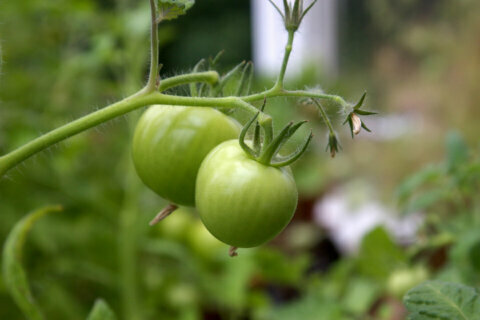Marie in Fairfax County writes: “Due to the excessive rain we had this past year, our holly and pine trees have put on some very noticeable vertical growth, but they didn’t fill out, so the tops of the trees have an odd, stick-like appearance. Will Mother Nature take care of filling them in, or do we need to prune that lovely new height back? And if we do need to prune them, when should we do it?”

One of Marie’s photos shows a beautifully full, well-rounded holly with a single shoot coming up the center of the top. It looks adorable.
Her pine trees have what appears to be totally natural growth at the top, but if she wants a more formal, topiary-perfect look, these shoots can be pruned back now or early in spring. The only time not to prune is in the fall.
Core aeration not a chore for spring
Steve in super-soggy Ellicott City writes: “I normally aerate my lawn in the early fall. Last year I did not, because the ground was so wet from record amounts of rain. Is there any reason not to aerate this spring, either before or after I apply corn gluten meal as a fertilizer and weed preventer? Is there an optimal time to aerate in the spring, after the ground dries out enough to avoid a muddy mess? Or should I wait until the fall?”
You should wait, Steve. Aerating in the spring would stress the lawn right before the summer heat arrives, and you never want to aerate wet soil. Core aeration — pulling little plugs of soil and sod out of your lawn — in the fall relieves compaction without stress.
Does garlic spray keep away bees as well as skeeters?
Matt in D.C. writes: “The mosquitoes are ruthless down here. I have my eye on getting some concentrated garlic oil to spray this season. But will the garlic spray scare off the bees and beneficial insects as well?”
Darn good question Matt — but I’m not sure anyone knows the answer.
Garlic oil spray has been found to keep mosquitoes out of the sprayed area for up to six weeks and is also said to deter ticks, but if the action is purely repellent, it could deter good insects as well.
One solution would be to spray everywhere you work and play outdoors other than the garden and other flowering plants. To increase your odds of getting lots of beneficials and pollinators in the garden, grow a lot of culinary herbs and let them go to flower. Bees and beneficials love the easily-attained nectar and pollen in the small flowers of herbs such as dill, cilantro and such.
A better way to battle biters
If you do the right things now, you can wipe out the all-important first generation of biters and get the math on your side for a change. (Instead of 10 females breeding a thousand, and that thousand breeding enough to blacken the sky, you wipe out the first 10 and live happily ever after.)
Instead of emptying all the stagnant water sources on your property, create more! Fill buckets, wheelbarrows and other containers with water and treat the water with BTI, a naturally occurring soil organism available in the form of doughnut-shaped dunks and shakable granules.
Start with the dunks; they’re more long-lasting. (Bang them apart with a hammer to make chunks for smaller water sources.) Then switch to the more powerful granules when you hear, or feel, your first bloodsucker.
Female mosquitoes will lay their eggs in the water, but no adults will emerge. And BTI is harmless to everything else.
Deer, deer, deer …
Tina in Forest Heights, “near Oxon Hill Farm Park, where too many deer live” writes: “I have successfully fended off deer, sort of, using crop cages and perimeter plantings of lots of herbs like basil and thyme plus marigolds. The deer did not previously go after my parsley and carrot greens, but last year: Chomp! Chomp!
“I’ve also had Lyme disease twice courtesy of these vermin. I really don’t want a fence around my whole veggie garden. What is the latest on plants that fend off deer?”
Eh, that they don’t exist, Tina — there are plants that deer won’t eat, but they don’t keep them from munching on your other stuff. Get a motion-activated sprinkler (the biggest brand names are Orbit and The Scarecrow). These devices chase off approaching deer with a spray of cold water. Effective and humane!







